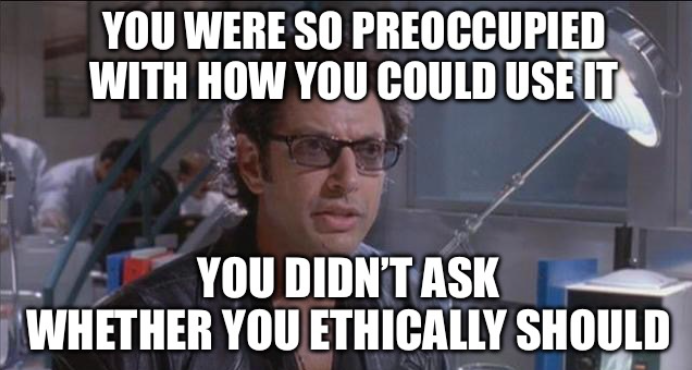Lawrie Phipps and Donna Lanclos
We’d like to acknowledge and thank Autumm Caines in the preparation of this post.
We offer the following text not because we think the relevant people will actually use it, but because we think they should.
This presentation/paper/work was prepared using ChatGPT, an “AI Chatbot”. We acknowledge that ChatGPT does not respect the individual rights of authors and artists, and ignores concerns over copyright and intellectual property in the training of the system; additionally, we acknowledge that the system was trained in part through the exploitation of precarious workers in the global south. In this work I specifically used ChatGPT to ….
Twitter is full of people shouting about ChatGPT. In our feeds, this includes academics, educationalists, and learning technologists. They are shouting about using it for session planning, using it to write papers, using it to write policies, and on it goes. Mastodon, and other socials are full of ChatGPT too, but there appears to be a lot more critical thinking in our Mastodon timeline as opposed to the Twitter timeline we’re trying to leave behind.
One commentator on a listserv suggested that “We might feel that AI is most usefully considered as another tool: in itself ethically neutral…”
(it is not ethically neutral)
(pretty sure that ethical neutrality is not a real thing!)
We point out the TIME investigation that brought some of the practices of the company behind ChatGPT into the light. Including outsourcing some of the training (through data) to Kenyan workers, to filter out toxic language from its dataset. These workers had to read graphic details of awful content such as child sexual abuse, bestiality and similar. The shifts were 8 and 9 hours and they had high targets. Sama, the company responsible for recruiting the workers, ended their contract with OpenAI early in part due to the traumatic nature of the work. They were paid less than $2 an hour for this.
When we call this out, some people say things like “well yes, but maybe we can reappropriate it for good things.” Reader, we are fairly certain that is not how being ethical works.
An acknowledgement, like the paragraph at the start of this article, might be seen as a “confession”, but a confession without contrition is worthless. Where does the use of this tool move the needle on our ethical scale?
We offer the paragraph at the start of this article as a way of citing your use of ChatGPT, and as a way of acknowledging that these tools have not been created to the same ethical standards that many in our education sector would like, and that their training and development has been done on data, on text, on art, without permission of the originators of that work.
But we might also suggest that you consider not using ChatGPT at all.


[…] use of ChatGPT in your classes, we would be remiss if we didn’t point out that there are ethical concerns about the tool, in general: from whose intellectual property is used to train the tool in the first place, to the […]
[…] of their limitations, even as they improve, and perhaps even one that explicitly acknowledges the unethical practices and human sacrifices madein the process of creating […]
[…] We started with an acknowledgement: […]